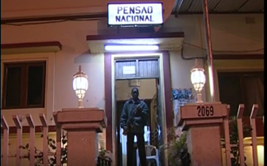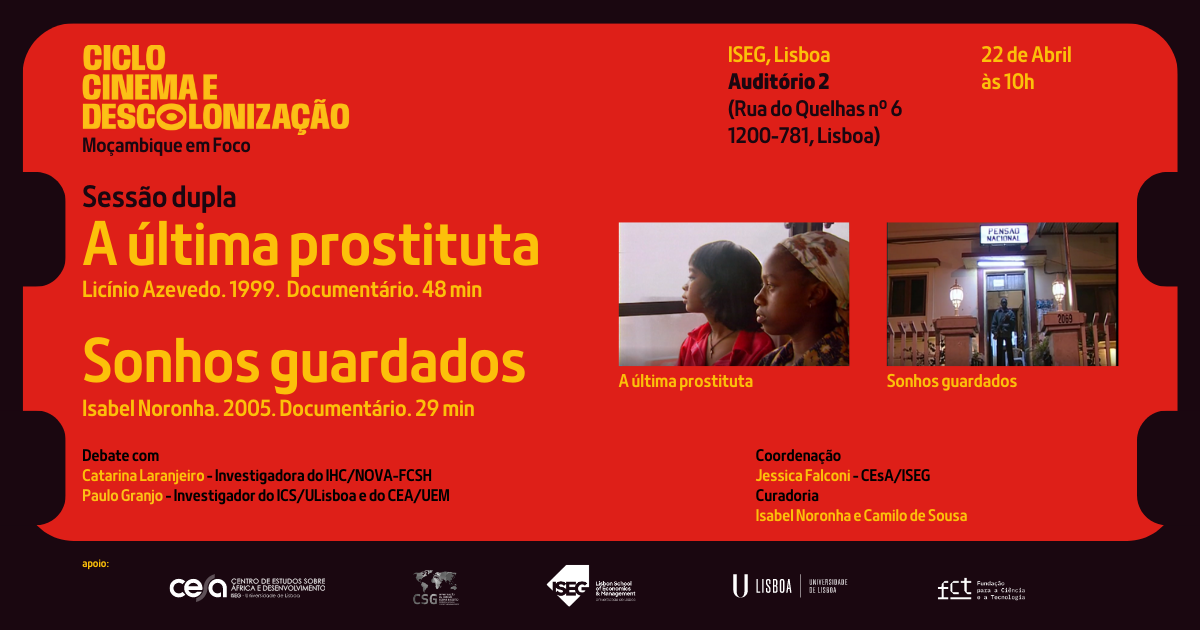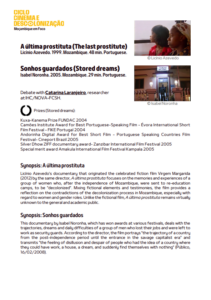“Cinema and Decolonisation: Mozambique in focus” cycle | April 22nd | The last prostitute and Stored dreams | Discussion panel with Catarina Laranjeiro and Paulo Granjo
The Centre for African and Development Studies (CEsA/CSG/ISEG/ULisboa), within the scope of the “Cinema and Decolonisation: Mozambique in focus” cycle, is pleased to announce the screening of The last prostitute (“A última prostituta” in Portuguese) (Licínio Azevedo, 1999, Documentary, 48 min, Portuguese) and Stored dreams (“Sonhos guardados” in Portuguese) (Isabel Noronha, 2005, Documentary, 29 min, Portuguese). The session is free admission and will take place on April 22nd, 10 am, at ISEG – Lisbon School of Economics and Management (Auditorium 2, Rua do Quelhas n. 6, 1200-781, Lisbon, Portugal).
The debate will follow with researchers Catarina Laranjeiro (IHC/NOVA-FCSH) and Paulo Granjo (ICS/ULisboa and CEA/UEM).
The film will be played in Portuguese. We recommend a pre-registration, but the capacity of the auditorium will be filled in order of arrival.
PLEASE REGISTER HERE: https://www.eventbrite.pt/e/bilhetes-ciclo-cinema-e-descolonizacao-mocambique-em-foco-22-de-abril-607287211397
Synopses:
 The last prostitute (“A última prostituta”)
The last prostitute (“A última prostituta”)
Licínio Azevedo’s documentary that originated the celebrated fiction film Virgem Margarida (2012) by the same director, “A última prostituta” focuses on the memories and experiences of a group of women who, after the independence of Mozambique, were sent to re-education camps, to be “decolonized”. Mixing fictional elements and testimonies, the film provides a reflection on the contradictions of the decolonization process in Mozambique, especially with regard to women and gender roles. Unlike the fictional film, “A última prostituta” remains virtually unknown to the general and academic public.
 Stored dreams (“Sonhos guardados”)
Stored dreams (“Sonhos guardados”)
This documentary by Isabel Noronha, which has won awards at various festivals, deals with the trajectories, dreams and daily difficulties of a group of men who lost their jobs and were left to work as security guards. According to the director, the film portrays “the trajectory of a country from the post-independence period until the entrance in the savage capitalist era” and transmits “the feeling of disillusion and despair of people who had the idea of a country where they could have work, a house, a dream, and suddenly find themselves with nothing” (Público, 16/02/2008).
About the panelists:

Catarina Laranjeiro
Catarina Laranjeiro is a researcher at the Institute of Contemporary History at NOVA FCSH, where she develops research on vernacular cinema in Cape Verde and Guinea-Bissau and their respective diasporas in Portugal and France. She holds a PhD in Post-Colonialism and Global Citizenship from the Centre for Social Studies at the University of Coimbra and an MA in Visual and Media Anthropology from the Freie Universitaet Berlin. She regularly participates in various projects and collectives that cross anthropology, photography and cinema. She directed the film Pabia di Aos (2013) and co-directed, with Daniel Barroca, the film Fogo no Lodo (2022).
 Paulo Granjo
Paulo Granjo
Paulo Granjo holds a PhD in Social Anthropology (ISCTE, 2001) and is a pioneer of industrial anthropology in Portugal and Mozambique. He began his teaching activity in 1999, as Visiting Professor at Eduardo Mondlane University (UEM), where until 2006 he contributed to the training of the current generation of Mozambican anthropologists. In addition to his continued participation in the master’s and doctoral programs at ICS-ULisboa, he was also an Invited Professor at ULHT, FLUL and FCSH-UNL. Member of the Scientific Council and of the Commission for Postgraduate Studies at ICS-ULisboa and Corresponding Researcher at the Center for African Studies at UEM.
Click on the imagem below to access the event sheet:
Related content:
- Blog post “Reeducação de mulheres, entrevista a Licínio Azevedo sobre o filme ‘Virgem Margarida'” (references to The last prostitute): https://www.buala.org/pt/afroscreen/reeducacao-de-mulheres-entrevista-a-licinio-azevedo-sobre-o-filme-virgem-margarida
- “Pela primeira vez está a haver uma revolta social grave” (references to Stored dreams): https://www.publico.pt/2008/02/16/jornal/pela-primeira-vez-esta-a-haver–uma-revolta-social-grave-249434
- Carmen T. Secco; Ana Mafalda Leite; Luís Carlos Patraquim (2019) Cinegrafias moçambicanas. São Paulo: Kapulana.
About the “Ciclo de Cinema e Descolonização: Moçambique em foco”
The project urges to understand decolonization as a process still in progress, which must be accepted and integrated into the social, political, cultural and personal dynamics. The project aims to create an open and dynamic space for sharing, where memories, narratives, dialogues and reflections can emerge. It is coordinated by Jessica Falconi (CEsA/CSG/ISEG/ULisboa) and curated by the Mozambican filmmakers Isabel Noronha and Camilo de Sousa.
The film club will take place from January to July 2023, with screenings once a month, always on Saturdays, where it is intended to debate and reflect on the legacies and memories of decolonization in Mozambique. Each session will have the spoken remarks of producers, directors, etc., as well as moderators and debaters who will facilitate the debate within the audience.
Coordination: Jessica Falconi (CEsA/CSG/ISEG/ULisboa)
Curators: Isabel Noronha and Camilo de Sousa
Scientific consultancy: Joana Pereira Leite (CEsA/CSG/ISEG/ULisboa) and Ana Mafalda Leite (CEsA/CSG/ISEG/ULisboa)
Support: CEsA/CSG/ISEG/ULisboa
Read more:
Check the full program for 2023 of the film club “Cinema e Descolonização: Moçambique em foco”
Author: CEsA Communication (comunicacao@cesa.iseg.ulisboa.pt)
Image: CEsA/Reproduction







